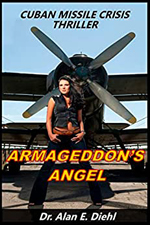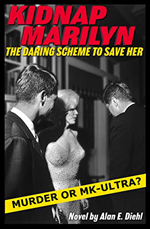Dr. Alan E. Diehl is the author of nonfiction investigative books and historical fiction that use his real-life experiences as a pilot, psychologist, investigator, and whistleblower. His newest novel is Armageddon’s Angel: Cuban Missile Crisis Thriller (December 2022). You’ll find Alan on his website at AlanEDiehl.com and his SWW author page.
 Armageddon’s Angel is the first volume of the Pandora’s Keys Trilogy. At what point did you realize you had a trilogy versus a series?
Armageddon’s Angel is the first volume of the Pandora’s Keys Trilogy. At what point did you realize you had a trilogy versus a series?
The manuscript was intended to be a standalone novel in 2012. But John J. Nance, who had written best-selling books and TV screenplays, felt my project might make a great television series, if it were longer. So, I begin thinking about what could have happened after the protagonist-school teacher stole the Russian missile launch keys during the 1962 crises.
Can you give readers a broader perspective of what your story is about? Characters? Setting?
During the Cuban missile crisis Nick, a Russian major, falls for Maria, a beautiful local school teacher. When the major’s colleagues mistakenly think the Americans are attacking, she steals their missile launch keys. The two lovers, with the help of her student, Elian, hijack an aircraft to escape from the island in a protracted chase scene.
You’ve had a distinguished career as a pilot, design engineer, research psychologist, and investigator. When did you realize you wanted to become a writer?
During a multi-decade career, I produced hundreds of technical papers, magazine articles, and a couple of book chapters. Once I retired, my media contacts suggested I write nonfiction tell-all books about what really happens during civil and military crash investigations, etc. So, I decided to write narrative nonfiction books, revealing insider information and how the system really works and why it sometimes fails with deadly consequences.
On your website you state you were a “whistleblower.” Was there ever a time in your career when you felt threatened by your decision to come forward with controversial information?
Yes. Government officials don’t want the public to know how the system works, or fails. When another scientist and I exposed an FAA top official for lying to Congress, he diverted the sky marshals to harass us. I was soon told to leave Washington immediately, or there would be severe consequences. Fortunately, John Nance had just written a book (Blind Trust) about my success in reducing airliner crashes, and the US Air Force hired me. I was immediately sent undercover to investigate a mysterious Soviet jetliner crash that killed President Machel of The People’s Republic of Mozambique. I was recently informed that a KGB major by the name of Vladimir Putin was also there.
While working for the Air Force, I was assigned by President Clinton to investigate the worst fratricide since Vietnam, where 26 US and allied troops died. The incident was caused by a four-star general (who had ignored one of my important recommendations). When I refused to go along with the Pentagon cover-up, I was immediately threatened, demoted, and reassigned. I then warned that other crashes would occur if my recommendations were ignored. Two years later, 35 people were killed when an Air Force 737 crashed in Croatia, killing Clinton’s secretary of commerce, Ron Brown. When I disclosed why the tragedy happened, the Pentagon established a “blue ribbon panel” headed by the former FAA administrator who I blew the whistle on earlier. Our Deep State works to protect their own interests and control whistleblowers. But a few of us are still willing to speak truth to power and try to educate and entertain the public at the same time.
That’s how the system works, but it gets more interesting. A classmate of mine from the USAF Academy, who became a senior Pentagon insider, informed me that the Secretary of Defense was furious at my exposing problems in his department and that they might go to a federal judge, claiming that I was a national security risk, which would allow them to take my clearance, pension, and job. Fortunately, I had friends in the media, so they never carried out the threat. But I was also told that someday my car might explode. Yeah, being a government whistleblower has interesting moments.
Given your extensive background, are there any parallels in your fiction that mimic your own experiences?
Many! For instance, in Armageddon Angel I discuss how a general briefed me on why the Pentagon-planned attack and invasion of Cuba never occurred. What actually happened was the super-secret plans were being transported from Washington’s Andrews Air Force Base to MacDill Air Force Base in Tampa. But the baggage compartment on the Air Force jet came open and the plans were lost. The officers at MacDill informed the Pentagon that because nobody knew where the plans had ended up, there would be a significant delay in the hastily planned attack. This gave Kennedy time to consider other options. He went with the naval blockade instead, literally preventing World War III. In subsequent decades, I interviewed many officials involved with similar situations, but knowing the government would never allow me to reveal the information in nonfiction books, I tell such stories in novels, but interject my actual role in the story. There used to be a commercial that said, “Is it real or is it Memorex?” Readers will have to figure that out in my “inspired by real events” treatises.
 In my first novel, Kidnap Marilyn: The Daring Scheme to Save Her, I also wove my real involvement into the fictional story after I interviewed a J. Edgar Hoover senior staffer who gave me details on how the FBI “monitored” the involvement of Marilyn with the two Kennedys. The novel tells what could and should have happened to this iconic actress if a CIA psychologist had been willing to risk his own life to rescue her. Furthermore, a close acquaintance who worked in Hollywood disclosed her own MeToo situations. That helped me describe such rapes in realistic terms. The use of hypnosis in that novel was also based on my own training in those techniques by the FBI and Pentagon. My involvement with interesting situations is included in my novels, but I wouldn’t dare put such information in nonfiction books.
In my first novel, Kidnap Marilyn: The Daring Scheme to Save Her, I also wove my real involvement into the fictional story after I interviewed a J. Edgar Hoover senior staffer who gave me details on how the FBI “monitored” the involvement of Marilyn with the two Kennedys. The novel tells what could and should have happened to this iconic actress if a CIA psychologist had been willing to risk his own life to rescue her. Furthermore, a close acquaintance who worked in Hollywood disclosed her own MeToo situations. That helped me describe such rapes in realistic terms. The use of hypnosis in that novel was also based on my own training in those techniques by the FBI and Pentagon. My involvement with interesting situations is included in my novels, but I wouldn’t dare put such information in nonfiction books.
What sets Armageddon’s Angel apart from other thrillers in today’s market?
Perhaps the most significant difference is that this novel deals with the most dangerous situation in human history. The Cuban missile crisis could very easily have resulted in World War III with hundreds of millions of casualties. While many novels are “inspired by real events,” my fictional thriller includes factual information that I witnessed or discovered from credible sources. It reveals what really happened during that seminal 13-day period. Of course, I spent decades researching information about that critical fortnight and thought the public needed to hear these revelations. In fact, the most dangerous element of the Cuban missile crisis was not the strategic rockets aimed at America, which were under the control of Nikita Khrushchev, but the well-hidden smaller battlefield nuclear weapons that were in the hands of junior Russian officers. How that happened is described in the thriller.
When can readers expect book two in the Pandora’s Keys Trilogy?
The second book in the trilogy will come out early next year and the third in late 2024.
You’ve written investigative books and historical fiction novels. Of the type of books you’ve written, is there one you find more enjoyable to write over the other?
Great question! Marilyn Monroe’s untimely death had always interested me. But the events involved in the Cuban missile crisis were world-changing, so I’d have to say Armageddon’s Angel was probably more important, and therefore enjoyable to write. I want readers and influencers to know what really happens behind the scenes, and I was fortunate enough to witness some of these events.
Who were your early influences, both personal and literary?
Safety advocate Ralph Nader, whistleblower Daniel Ellsberg, President John Kennedy, and ABC News’ John Nance (who helped me master both nonfiction and novel writing).
Is there anything else you’d like readers to know?
Yes, to use an aviation cliché: “Fasten your seatbelts. This is gonna be a bumpy ride.”
Also, readers might want to check out the following:
- A one-minute video that explains my non-fiction book Air Safety Investigators: Using Science to Save Lives—One Crash at a Time
- My CNN State of the Union interview.
- The AP interview about the jet that crashed after flying over the capital in June 2023.
 Su Lierz writes dark fiction, short story fiction, and personal essays. Her short story “Twelve Days in April,” written under the pen name Laney Payne, appeared in the 2018 SouthWest Writers Sage Anthology. Su was a finalist in the 2017 and 2018 Albuquerque Museum Authors Festival Writing Contest. She lives in Corrales, New Mexico, with her husband Dennis.
Su Lierz writes dark fiction, short story fiction, and personal essays. Her short story “Twelve Days in April,” written under the pen name Laney Payne, appeared in the 2018 SouthWest Writers Sage Anthology. Su was a finalist in the 2017 and 2018 Albuquerque Museum Authors Festival Writing Contest. She lives in Corrales, New Mexico, with her husband Dennis.


























Leave a Reply